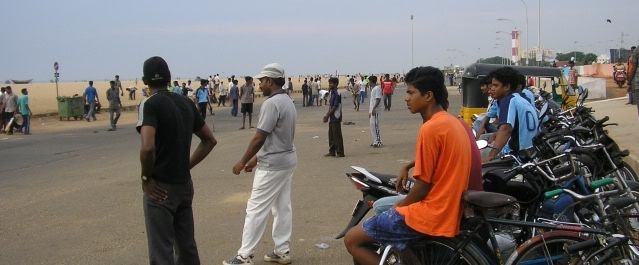
Cochin, Kerala. April 22-25, 2005.
Sunday, July 31, 2005
"The Validation of Feelings: What Marriage Can Teach You About Management"
So how can these types of conflicts be handled? Like a marriage - by validating feelings and keeping in mind what is really important. Accusing someone of feeling "the wrong way" about something is a sure way to escalate the problem. But validating that person's feelings with a "I understand why you feel..." is a quick way to defuse the situation. It also helps you see things from the point of view of the other person, which helps you better frame a solution to the problem. Even if a solution isn't reached, employees, spouses, pretty much anybody, will feel better knowing that someone understands their point of view.
MBA teaches you the art of interacting with (not necessarily managing) people. Especially the period in which you have to undergo mandatory groups. Because you can't choose your groupies, you have to make do with whoever you have. The chemistry among groupies makes or breaks it's performance. People will easily make out whether you are "a great guy" or just avoid you. If you make a switch from the latter to the former, you learn't the lesson. Otherwise you already have it. If you are neither, you better work on it!
Disagreement generates conflicts. Say on preparing a presentation, or on answering a question. If you feel like disagreeing with a person, don't. Instead figure out how much you differ. Concentrate on the items you agree and tell the guy that you agree on those aspects. If you have major to make, take the guy aside and talk to him one-on-one and explain why you feel those changes are required. Because there is no one around, the guy will take it well, based on the merit of what you say. Be pleasing enough though.
Second, if you only need fewer changes, praise the guy first. "That is an excellent work". "Good job." Then tell him, you made "minor" changes and send the doc away. That will give the guy a "psychological cover" to his ego and help him put through the changes without bringing in ego issues.
If you just propose the changes, without regard to his/her feelings, he/she may hear you as "this is junk... make these changes to improve it" though that is not what you mean.
Well the situation could be different if you enjoy a lot of rapport with your groupies or your colleagues for that matter.
People who "listen to the others' feelings" can make a big difference in a gathering by taking over a coordinator's role.
I am fortunate to get a mentor at work who is a "guru" of getting things done. "How to win friends and influence people" also helped me a lot.
Saturday, July 30, 2005
The city I love!
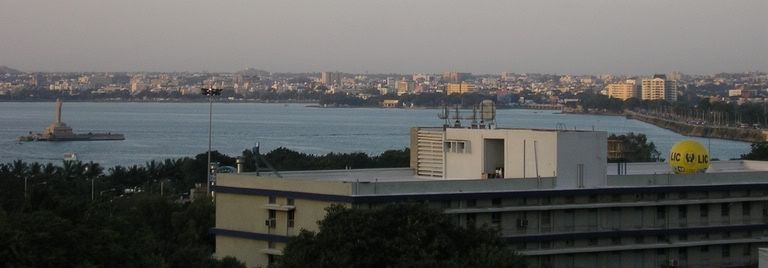
Hyderabad... the city I love. This picture was shot from the Birla temple. I have retained the picture as it is (sizewise) to originality.
Friday, July 29, 2005
Less for more?
Did you ever get a minor exception from a credid card company? Why talk about exceptions? Have you got anything done before you called them umpteen number of times?
Talk about all the money that cr card companies sink into to their systems. What has the customer got out of the technology investments? If all activity in a bank is to serve the customer, should these investments not benefit the consumer? Is it good sense to make investments that don't result in savings for a customer?
Rama Bijapurkar wrote in the ET that technology investments yield more to the corporates than to the consumers. Can't agree more... having gone through the rigma roll of calling up the credit card companies! You deviate a little and it takes for ever to close your request because systems are designed to address the 90% of the transactions that form 10% of the "categories" of transactions. The rest of the transactions are eternally waiting for the next udpate!
Sure some metrics that the companies track improved and yes the company has been able to "pool" the capacity. But customers are worse-off. Some costs are even transferred to the customer. For example, Internet banking - who does the data entry for the bank? When you call a bank, who incurs the cost of calling? Banks have thrusted on consumers a part of transitioning. And that is big for each individual (example, you have to go to the bank to register yourself. That takes anywhere between 15 min to 45 min!) Obviously, if you don't transact a lot, you are in the red because you invest your time and reap the benefits over a period of time. The cost (time or money) of 'setting-up' the infrastructure for one or few transactions is more than the benefit that accrues to us.
No matter what I said above, if the banker banker is customer centric, she will be able to get it's act together. It shows up over a period of time! (e.g. Honda started installing cup holders in a car and that model became popular becuase of that! Another one...do you have a Honda vehicle? Look at how easy it is to slide the key into your key ring) If she is not, she can never get it right because 'decision makers' in the organization don't usually get a raw deal. Customers cant "tell" the company because they can't talk to someone else when things go bad (if you can't get stuff done through telephone banking, can you talk to higher-ups?). So the customer "service" executives act as "customer repellants." What is surprising is that most bankers, across the country, or probably across the world, are on the same boat. They play the "chavatayanu nenu, neekante pedda chavatayanu nenu" (I am a fool, I am a bigger fool than you) game.
Tuesday, July 26, 2005
Guess where these pictures were shot!
This was a sunset shot in ISB. Guys from ISB, this place is the tennis court and the hill beside it. Just to SVII and look at the hill from H block. You will see this.
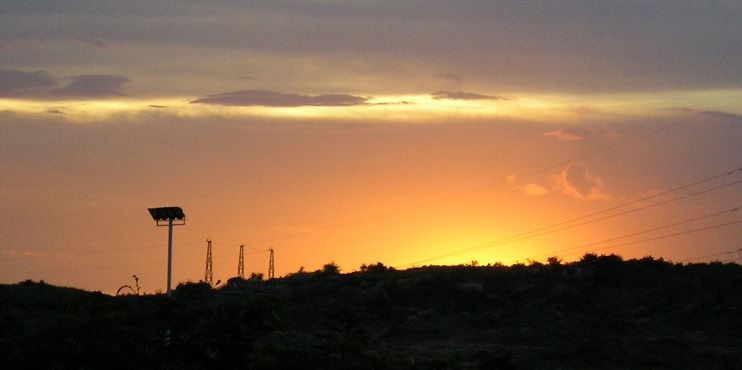
This was shot in IIM-A. The new block was under construction that time.
The first two will be obvious if you know the place.
This one was shot in Juntar Mantar. If you go up the 'stairs' in between, and shoot from the top, this is what you will get. Also you can see the difference in "depth" between the lower part of the picture and the rest.
Third one IS a bit tricky.
Sunday, July 24, 2005
"Bloggable pictures"
For good or bad, that prompted me to pick up pictures from my archieves. I will post them on my blog in the next few days.
A point-of-no-return in a career
A discussion with a friend re-triggered my thinking on this topic. Is the decision we make in our MBA lead us to a point-of-no-return? Can you still laterally move into the industries that you eschewed in favor of others? Are the moves similar to those Vivek paul made limited to those in his category?
Will new industries like IT, BPO and the like be as accomodative as they have been till now? Will your choice be limited to such new industries?
Saturday, July 23, 2005
Up up and away!

Bird sanctuary, Kumarakom, April 05.
"Bubbly" water at the nose of a boat.
Alleppey, Kerala, April 05.
A splash of greenery



Since these pictures were shot, I shot pictures time and again. However, visiting some photography blogs (listed on the side bar) showed me how much more to learn. I guess I will concentrate on learning the technicalities of Photography from now.
Journey homewards: A photo tale
Here is a link to the album.
I created one on IIM-A campus as well. If you would like to view it, please send me a mail. I will email it to you.
Chennai lovers.. here are some good scenes

I want to call this snap Malgudi. Cozy and homely street (see that 'school ahead' sign?)
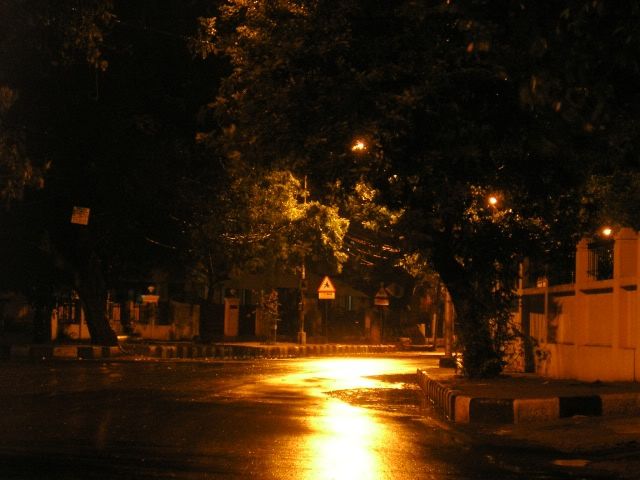

this is Coral Reef... ;) this is a tree just under the street light.

What makes successful entreprenuers?
Jeff Cornwall says it is the ability to spot opportunities. Business Pundit agrees.
Jeff:
If we look at what differentiates successful entrepreneurs from the unsuccessful ones, the most important craft is opportunity recognition. This is a process that we have learned how to systematize and teach to entrepreneurs.
Entrepreneurs who have the most success are those who are able to find a real niche in the market that offers enough of a margin to meet their needs and aspirations. Successful entrepreneurs understand the importance of "failing on paper." They carefully assess their idea to make certain that it has an adequate market and enough profit margin before they ever launch their venture.
As more and more entrepreneurs are being trained worldwide, it is this one skill, this one technology, that is having the biggest impact on their success.
Opportunity lies in the "eyes of the beholder." If you "look" for opportunities, you will "find" them.
I am tempted to compare entreprenuership with photography. Cos, photographers just look for opportunities (sunrises, places with natural beauty etc.) to shoot. I will say Photography is 80% right place and right time and 20% skill.
Coming back to entreprenuership, Prof. Venkataraman taught us cases in which he asked us if there was opportunity that the protagonist could after. Most of us in the class thought there wasn't. He then tweaked the numbers here and there and showed us the opportunity that we were looking for. I guess successful enterprenuers "see" this opportunity to change the game - and numbers in their favor.
Monday, July 18, 2005
Twilight on the Marina
How often do you see this? If we get up at the 'usual time' aren't we missing a lot of fun?
These guys aren't missing any fun!
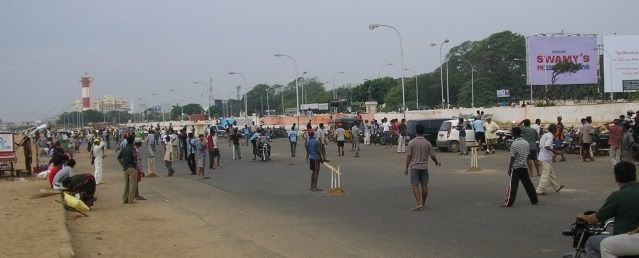
Initiatives to power the knowledge economy - Kiran Karnik
Mr. Karnik regularly talks about such issues and writes articles with flashy titles. However if you really look into the article, you barely find anything new. For.e.g. this article is a listing of issues and possible cliche and incomplete answers to problems. However he does make a couple of good points. One is given above in italics and second is about pulling crowd to Nasscom's HR meet in Chennai.
Payback time
I started to do that in Chennai only in a different format. I am visiting an orphonage called "Samrakshan" where I have started to teach (from more than a month now) some subjects right now. The target is to enthuse them in studies and help them envision a career and growth for themselves. As of now, I have just targetted older children cos the younger children could afford to wait a little.
As of now the children seem to be enjoying it. Feedback is good and enouraging. They participate in weekly activities and volunteer to present some of the "lessons" themselves.
The next step is to get the children access to Internet (first to computers). I am planning to get this in the next one month.
Sunday, July 17, 2005
Outsourcing: Negotiating a perfect fit
Nasscom to set up database of BPO employees
This could reduce attrition. However, it is voluntary for employees to register on the database. Success of this database will depend on the network effects (more the percentage of employees who enroll in the database, greater its effectiveness and the pressure on the others employees to enrool themselves.
Saturday, July 16, 2005
Are tech companies short-sighted?
Are the tech companies doing it right? How will this strategy of taking advantage of the increase in supply impact short and long term supply of this industry?
are tech cos that reduced entry level engineer's salaries to sub 15K levels overkilling the opportunity that free markets gave them? Is there any "ethics" involved in this?
Sunday, July 03, 2005
Pictures from Kerala trip

I really wanted to post my comments on each of the pictures when I posted these pictures first.
It's high time I did it.
This picture was taken in Kumarakom bird santuary. The Kerala tourism department has a good hotel there and bird sanctuary is "embedded" in the hotel.
Shooting birds is a pain in the neck... literally. It's hot sun on your head... Birds fly too fast for a camera... you have to look through the camera while you are waiting for the birds and hush.. there went a bird... it just flew and you had no clue and the camera was too late to respond. You just ended up with a an empty sky shot... too bad.. the next bird flew.. but it is too high.. so.. nothing again... then comes the next bird that barely managed to enter your camera... and there you go.. this is that shot. The good part is.. it looks good!
I would say shooting birds (that could be an offence in some act or the other... I only mean taking pictures) is difficult.

This picture is different in a couple of ways. First - it was shot from a train. Second, it looks like a flame blazing out of the earth. This is a sun set shot when the sun is just about to set and a small hill came in between. This shot is the result.

This picture is a sunrise shot at Kanyakumari. Other than the fact that you can watch both the sunrise and the sunset there, both are very beautiful as well. I must say I was lucky on that day to see such a beautiful scene because at times, you could return empty handed of there is an overdose of clouds on that day. e.g. I went for a sunrise today (Jly 17th, 2005) to Marina beach and all I saw was coulds!


This picture once again was shot from the train on the starting day of my trip. So this was in Hyd. I will call this picture "God's Decent."
Saturday, July 02, 2005
Options reset?
http://www.businessweek.com/cgi-bin/register/archiveSearch.cgi?h=05_28/b3942429.htm
He ventured out at 29! Does this reset my clock? and do I have to revisit my timelines?
Another question... Are options (read industries) that I considered before I joined the current role still open to me? Or Are those options closed to me ?


